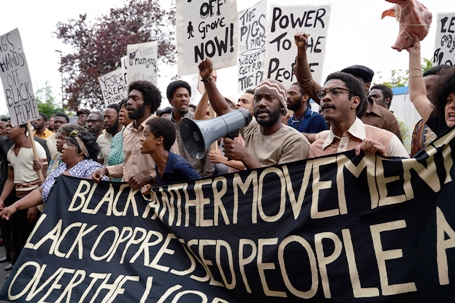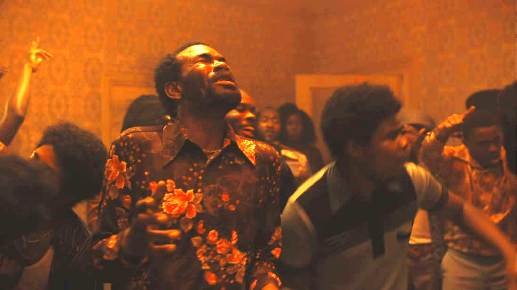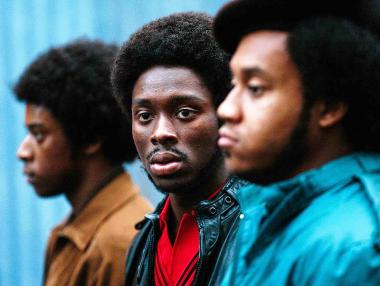
 Five films from British director Steve McQueen, depicting the experiences of West Indian British families in London from the late 1960s through the 80s, is one of the great cinematic achievements of the century.
Five films from British director Steve McQueen, depicting the experiences of West Indian British families in London from the late 1960s through the 80s, is one of the great cinematic achievements of the century.
What have you been doing during the pandemic? Well, British director Steve McQueen, best known for the Academy Award winning film 12 Years a Slave, has been very busy. He released five motion pictures in 2020. That’s right, five. In the midst of one of the world’s great disasters, McQueen gave us one of the great achievements in cinema of this century. They comprise a film anthology for the BBC, that played here in the States on Amazon Prime. The title is from a Bob Marley song that mentions as a metaphor of resistance a big tree being felled by a small axe. Each film tells a story about West Indian immigrant families in London from the 1960s through the 80s. Small Axe was marketed as a TV series, which in a way it is because theatrical exhibition went down during the pandemic, and TV was the only way to show them to a wide audience. But make no mistake, these are films, each one with a different story and characters.
The first and longest is Mangrove, telling the true story of a London restaurant called The Mangrove, started by Frank Crichlow, an immigrant from Trinidad. The Notting Hill neighborhood was a center for the West Indian community in the late 60s. The restaurant there instantly attracts a host of loyal customers, not only for its excellent Caribbean food, but as a sorely needed place for people to meet and socialize. But the police don’t look kindly on black people gathering together, and headed by a racist constable named Frank Pulley, they conduct a series of raids on the restaurant, claiming that it is a source of drugs and crime. Crichlow is not an activist; he just wants to be left alone, but his friends rally to support him with a protest march. The cops surround the protesters and violence breaks out. Nine people, including Crichlow, are arrested and charged with rioting. The case of the Mangrove Nine sparks political controversy.
A large cast, headed by Shaun Parkes as Crichlow, brings the grueling ordeal of the long court case to life. McQueen, whose parents were from Grenada and Trinidad, conveys the behavior and conversation of these characters from the inside, as we are immersed in the atmosphere of the London streets in that era. There are no punches pulled; we witness the real effects of white supremacy as experienced by black Londoners. The honest depiction of truth has a liberating effect on the viewer. This is intense, vibrant movie making.
 The second film, and the most highly praised critically, is Lovers Rock. It tells of a reggae house party put on by a group of largely Jamaican Londoners in the 70s. Once again, there are many characters whom we follow through a single day during the preparations and then the actual party, where people get high and dance to a mix of reggae and American soul music. Never have I seen a party so perfectly portrayed on screen. It’s as if you’re actually there—it’s a very seductive experience in which some difficult sexual politics get played out as well. The film finally narrows down to one woman and one man, making a profoundly emotional connection.
The second film, and the most highly praised critically, is Lovers Rock. It tells of a reggae house party put on by a group of largely Jamaican Londoners in the 70s. Once again, there are many characters whom we follow through a single day during the preparations and then the actual party, where people get high and dance to a mix of reggae and American soul music. Never have I seen a party so perfectly portrayed on screen. It’s as if you’re actually there—it’s a very seductive experience in which some difficult sexual politics get played out as well. The film finally narrows down to one woman and one man, making a profoundly emotional connection.
The third film is titled Red, White and Blue, which refers to the colors of the Union Jack. It stars John Boyega, who you might remember from the recent Star Wars films, as Leroy Logan, the first black officer in the London Metropolitan Police. His family and friends are scandalized at his decision to become a cop, and it alienates him from his community, but he wants to reform the system from within. The obstacles are far greater than he expected, as once again McQueen brings home the structural racism of the system. Boyega is excellent as the flawed but courageous man who perseveres.
 In Alex Wheatle, the title character played by Sheyi Cole, is an orphan pushed through the brutal foster care system who eventually ends up in prison, an odyssey of pain that brings us to the depths of oppression, so vividly presented by McQueen. Here we are forced to confront the worst aspects of human nature, and we must recognize ourselves as implicated. It comes as a shot of inspiration at the end to learn that Alex eventually became a famous YA novelist telling stories of black youth.
In Alex Wheatle, the title character played by Sheyi Cole, is an orphan pushed through the brutal foster care system who eventually ends up in prison, an odyssey of pain that brings us to the depths of oppression, so vividly presented by McQueen. Here we are forced to confront the worst aspects of human nature, and we must recognize ourselves as implicated. It comes as a shot of inspiration at the end to learn that Alex eventually became a famous YA novelist telling stories of black youth.
Finally, the last film, Education, is about a boy who gets separated from classmates to be put in what they call “special education” but what his mother discovers is just a way of weeding out black students from the school system by labeling them “subnormal.” The spiritual evolution of the mother played by Jade Anouka from a strict emotionally shut down mom to someone who cares and advocates for her son, is very moving. The London school system actually was guilty of this in the 80s. The film seemed to me to end too soon, but it’s still worthwhile.
Seen together or separately the Small Axe films are great works of art, and an essential document for our Black Lives Matter era, showing us where we came from, and where we need to be.

